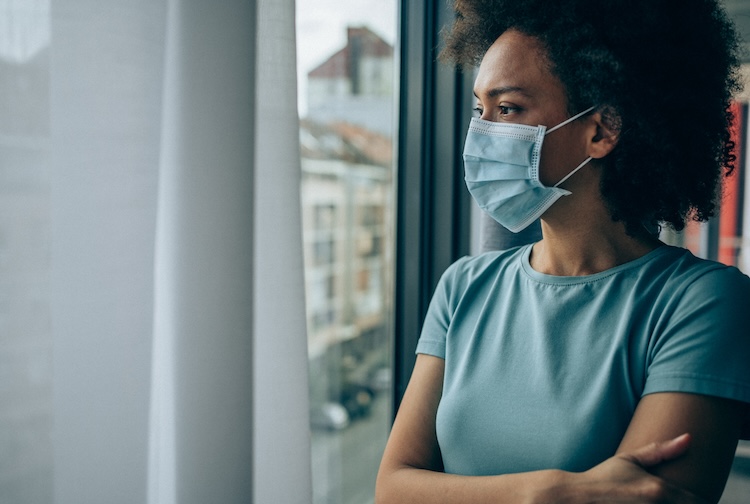
Flu, cough and COVID-19: Know the differences
VCU Health infectious disease expert Gonzalo Bearman, M.D., shares how to best protect yourself and your loved ones from getting severely sick this fall and winter.
September 23, 2024 Three different respiratory illnesses are being tracked across the United States. (Getty Images)
Three different respiratory illnesses are being tracked across the United States. (Getty Images)
This story was originally published Nov. 10, 2022, and has since been updated to include new information about the 2024-25 respiratory illness season. Stay up to date on all health news by visiting VCU Health News. (Updated Sept. 23, 2024)
By Sara McCloskey
Respiratory illnesses tend to spread more often during the colder months. Similar to last year, health care professionals are keeping their eyes on three highly contagious illnesses affecting our community: COVID-19, influenza (flu), and respiratory syncytial virus (RSV).
“It is difficult to discern one viral infection from just another five symptoms, therefore an assessment by a medical professional and nasal swab testing is important,” said Gonzalo Bearman, M.D., an infectious disease expert at VCU Health. "Viral respiratory infections continue to cause significant illness, this risk can be decreased by the current vaccines.”
Earlier this year, the Centers for Disease Control and Prevention released new guidelines on when to stay home and isolate yourself from others if you are sick with a respiratory illness. Sometimes, people are not sure what specific illness they have until they get tested. Since COVID-19, flu, and RSV also spread similarly, the strategies to prevent someone from spreading them are now more similar, too.
“These new recommendations were created to be a more simplified, practical way to prevent the spread of COVID-19 and other highly contagious respiratory viruses,” Bearman said. “Vaccines and medications are available for COVID-19, flu and RSV. Vaccines, in particularly, significantly decrease the severity of illness, and decrease hospitalizations."
As we head into respiratory illness season, Bearman shared with VCU Health News the differences among these viruses and tips for keeping yourself healthy.
What are the symptoms of COVID-19, flu, and RSV – and how can I tell if I have one virus vs. another?
This is a tricky question, since there is much overlap between the three illnesses, and they can all start with very similar symptoms. All can cause fevers, cough, shortness of breath, decreased energy, sore throat, headaches or runny nose. Flu and COVID-19 are more likely to cause body aches or muscle pain. Less commonly, stomach issues such as nausea or diarrhea can occur. COVID-19 is more likely to cause a loss of taste or smell, although this can be seen in other illnesses as well.
Overall, the best way to tell the difference is to get tested. You can go to the doctor’s office to get tested for all three of these illnesses or buy COVID-19 tests at your local pharmacy.
Who is most at risk of getting severely sick from these viruses?
Children, older people, and immunocompromised patients are at the highest risk of getting severely sick with all of these diseases.
Particularly for COVID-19 and flu, infants, those over 60 years old or people with chronic conditions are at higher risk (such as cancer, heart disease or diabetes, to name a few). Despite this, COVID-19, and flu can cause young healthy patients to get seriously sick, too.
RSV can cause severe illness particularly for babies under 6 months and older adults. Most young healthy adults do not get severely sick.
How can people best protect themselves?
As we have experienced during the pandemic, changes can happen quickly. Be on the lookout for any changes in recommendations from medical professionals locally or federally.
Getting vaccinated is still the best proven way to prevent yourself from getting severely sick. Flu and COVID-19 vaccines have been available for several years and they are updated annually to better protect you from the specific variants currently circulating the community.
This is also the second year that several different RSV vaccines and medications are available for specific populations. RSV vaccines are being recommended for adults 60 and over as well as pregnant people, who can pass immunity to the virus to their newborns. Another medication was developed specifically for babies and toddlers that provides temporary immunity for several months.
If you have any questions or concerns, do not hesitate to reach out. Talk to your primary care provider about your eligibility for these voluntary vaccinations and medications.
Here are some other quick tips:
- Wash your hands often with soap and water for at least 20 to 30 seconds. Avoid touching your eyes and mouth as much as possible.
- If you are sick, stay home. Try to avoid contact with others as much as possible.
- Use tissue paper or your upper sleeve to cover your cough and sneeze.
- Consider wearing masks, particularly if you are in a crowded public place (like a public bus or train) or if you’re around others who may be sick or at high risk of getting really sick.
When should I consider going to my family or primary care doctor?
If you have mild symptoms, it is best to stay home. You should still get tested and should contact your doctor, especially if you are at high risk of getting severely sick.
At what point should I go to urgent care or an emergency department?
You should seek urgent medical care if you are:
- Having difficulty breathing or persistent chest pain.
- Experiencing increased confusion or decreased consciousness.
- Seeing that your lips/nails/skin becomes pale/blue/gray, which can be a sign that you are not getting enough oxygen.
The CDC released new guidelines for isolating when sick with COVID-19 in early 2024. Do these guidelines apply to other respiratory illnesses?
The short answer is yes. These new recommendations aren’t technically COVID- or virus-specific, but rather the CDC issued a Respiratory Virus Guidance to be a “practical” approach to address these health risks for the general public. This guidance does not apply to health care settings.
Respiratory viruses typically spread from respiratory droplets, like sneezing into the air without covering your mouth, and from hand-to-hand contact. You are typically less contagious if your symptoms are getting better overall and you have not had a fever for 24 hours (and are not taking a medication that can reduce your fever).
Even if you feel better, you can still spread an illness. Once you go back to your normal activities, medical experts say you should still be mindful for the next five days to curb the spread. You can do that by socially distancing yourself from others, wearing a mask and thoroughly washing your hands.



